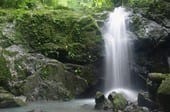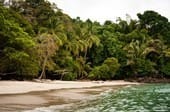Study an ITTT course in Costa Rica and encounter one of the world’s most attractive destinations. The area of Manuel Antonio is an amazing location to study a tefl/tesol course as it offers clear blue waters, flourishing jungles, small bays and some of the most beautiful beaches in the world. Because Costa Rica is such a great country to live and work in, it is no surprise that our TEFL/tesol courses have become very popular here.
TEFL/tesol costa rica – Manuel Antonio
You can enjoy many beach activities here such as scuba diving, surfing and snorkelling. While trekking along one of the many hiking trails available, animal lovers may encounter iguanas, white faced monkeys and more than 350 different species of birds and many other animals. Taking an ITTT course in Manuel Antonio, Costa Rica can open up many job opportunities in cultural and exotic locations all over the world. After being awarded your TEFL/TESOL certification you may find yourself so attached to Costa Rica that you may never want to leave.
Manuel Antonio Climate
You will experience a pleasant temperature all year round in Costa Rica, with coastal areas experiencing regular sea breezes. There are two particular seasons in the country. The rainy season lasts from May to November, during this period the majority of the rain comes in the late afternoon or early evening. Between November and mid May the skies are typically clear with the odd short rainfall weekly as opposed to daily. Manuel Antonio has an average yearly temperature of 89 °F / 31.7 °C.
Apply now & get certified to teach english abroad!The School
Located in the beautiful city of Manuel Antonio, ITTT’s Costa Rica TESOL course takes place in a newly remodelled building with an air-conditioned main classroom, on-site café, large common areas and a computer lounge with internet. There is also free Wi-Fi available at the center. Wi-Fi and the computer lounge are available for use at the school seven days per week. In the area around the training center you will find a variety of amenities including banks, restaurants etc.
Accommodation
Accommodation options for trainees on our Costa Rica TESOL course include home stay, private apartments, hostels and hotels. Home stays can be arranged in Quepos with a local family and includes a private bedroom in the family home plus breakfast and dinner during your stay. Home stay accommodation is a great way to experience the real Costa Rica and practice your Spanish skills while studying for your teaching certificate. For this option we need to be notified in advance and home stay accommodation should be secured at least one month before the start of your course.
We also have a list of other accommodation options including hotels, hostels and private apartments. Once your place on the course has been confirmed, you will receive an accommodation preference form from us to enable you to choose the best option for your needs. It is advisable to let us know your preference as soon as possible as accommodation availability is on a first-come, first-served basis.
Course dates
2025
- 21 July 2025 - 15 August
- 20 August 2025 - 16 September
- 22 September 2025 - 17 October
- 22 October 2025 - 18 November
- 24 November 2025 - 19 December
2026
- 19 January 2026 - 13 February
- 18 February 2026 - 17 March
- 23 March 2026 - 17 April
- 20 April 2026 - 15 May
- 20 May 2026 - 16 June
- 22 June 2026 - 17 July
- 20 July 2026 - 14 August
- 21 September 2026 - 16 October
- 21 October 2026 - 17 November
- 23 November 2026 - 18 December
Course fees
The total price is divided into: deposit and balance.
The deposit may be paid via:
- Credit Card
- Paypal
- Wire transfer
- Western Union
The balance of the course fee must be paid by cash, PayPal or bank transfer directly to the training center before your course begins.
US$ 400
US$ 995
Accomodation Fees
The accommodation fees are not part of the course price and you are free to choose whichever accommodation option you prefer.
If you choose to use one of our accommodation options, it should be paid for directly to the provider prior to your arrival.
US$ 795
Private apartment
US$ 740
Host family, private room, two meals (breakfast and dinner)







